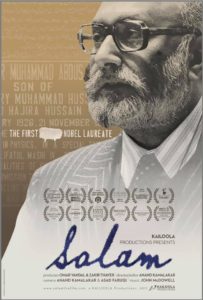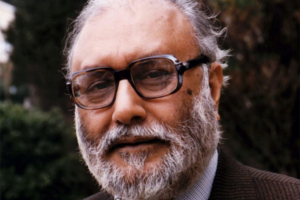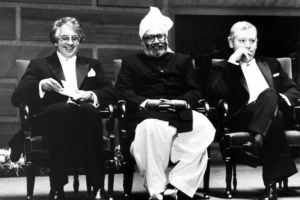
DFW SAFF 2019 Documentary Film Review “Salam”
WATCH THE TRAILER HERE
First, the Recap:
A crowning achievement. It is something to be strived for, then accomplished, then celebrated, ideally leaving a legacy of inspiration, further education, and lasting impact that can even shape future generations of those it influences. This, however, is not a perfect world where unfettered idealism, sense of deep patriotic accountability, and deserved levels of recognition for accolades earned are paramount like they should be. Instead, there are the dividing lines created when clashing ideologies arise, science vs. religion, aforementioned idealism vs. overt cynicism, established heritage vs. contemporary advancement, and the driving desire to provide a country’s people with a newly founded pride and standing amidst those that sought nothing more than to disavow the provider of this as a heretic.
Welcome to the reality of one man whose amazing, impactful successes in the world of physics would garner him one of the most prestigious awards he could attain–the Nobel Prize. Having won the honor in 1979, Pakistani physicist Dr. Abdus Salam became the first Pakistani to be awarded as such. Having come from a humble but prolific childhood where he became a prodigy, even amongst a family of eleven children. In his adulthood, as he pushed the boundaries of physics and came to its ultimate culmination, everything gained would be tarnished by blatant narrow-mindedness and fanaticism, as Dr. Salam’s particular sect of the faith, known as Ahmadiyya, was a community shunned by right wing Muslims who did all they could to discredit one man’s triumph and vilify him in the eyes of a grateful nation.
Next, my Mind:
Another offering making its Texas premier at the 2019 Dallas Fort Worth South Asian Film Festival sponsored by Toyota, this newest documentary film from director/editor Anand Kamalakar plus producers Zakir Thaver and Omar Vandal delivers a narrative that is as magnificently illuminating in its subject’s history and inspirational aptitude as it is heartbreakingly sobering in the candid portrait it paints of deliberate disregard and bigotry, the latter of which is sadly becoming more and more commonplace in today’s world. What this critic finds so moving about real like stories as portrayed here is that it proves the ability of anyone from anywhere has the capability to strive for greatness not just for themselves, but rather for a greater whole and more all-encompassing good that will leave an impression to generations well beyond their own, which is exactly what transpired in the heart and soul of a nation due to Dr. Salam’s research and findings in the realm of physics, putting Pakistan on the map in a whole new way.
But, the story then takes a turn that also showcases that with this great victory came a wealth of problems that threatened to overshadow everything the Nobel Prize meant for Dr. Salam personally and professionally as well as his standing in the eyes of a country who still loves him, yet also contains many who reject all he is, thanks to religion and the extremism that can come from it. As mentioned in the synopsis above, Dr. Salam was a part of a fraternity of the Muslim faith called the Ahmadiyya, who specifically didn’t necessarily share the highly coveted belief most of the Muslim faith holds, which is the finality of Mohammed. Quickly pegged for what the majority of Muslims considered heretical dogma, Dr. Salam was ostracized even further once the official decree went out from the Pakistani parliament in 1974 announcing all Ahmadis as non-Muslims. More than taking it as a sign, Dr. Salam left Pakistan for London, though he never fully cut ties to his beloved homeland, flying under the radar via certain scientific groups he remained a part of.
The film likewise takes a look into the fact that even other aspects of his personal life, albeit highly private overall, weren’t necessarily peaceful or completely settled, having been married twice and being somewhat divided between the two families that were created out of them. Still, Dr. Salam’s achievements leading up to the Nobel Prize remain beyond compare, having founded the International Centre for Theoretical Physics (ICTP) in 1964 to provide a platform for the study of physical and mathematical sciences, as well as the International Nathiagali Summer College (INSC) in 1974 that still to this day holds yearly gatherings to discuss physics and science, in addition to other organizations and opportunities for academics from all around the world to meet and compare minds on all things science, technology, and beyond. All the while, Dr. Salam’s tenacious hold on his faith and the beliefs within them remained along with his grander, unwavering adoration for Pakistan and its people. The film takes us as the viewer on this visually effective journey that still feels like it only scratches the surface of a luminary who chose to stay true to who he was, in spite of any and all opposition, not to boost himself up, but to simply illustrate that heart and soul can trump ignorance and hatred.
And so, in total, “Salam” stands as highly worthy documentary feature that carries with it elements encouraging and affirming in the beauty of human accomplishment and selflessness it presents while also disquieting and vexing in the blunt picture of overt judgement and prejudice portrayed. When it comes to the insidiousness of the latter, may we all learn to better avoid them and not buy into malice so as to purely relish and appreciate what Dr. Salam and so many before and after him have contributed to the betterment of our society, regardless of race, color, religion, sex, or creed.
As always, this is all for your consideration and comment. Until next time, thank you for reading!





